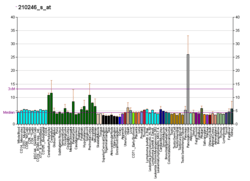ABCC8
ATP-binding cassette transporter sub-family C member 8 is a protein that in humans is encoded by the ABCC8 gene.[3][4] ABCC8 orthologs [5] have been identified in all mammals for which complete genome data are available.
The protein encoded by this gene is a member of the superfamily of ATP-binding cassette (ABC) transporters. ABC proteins transport various molecules across extra- and intra-cellular membranes. ABC genes are divided into seven distinct subfamilies (ABC1, MDR/TAP, MRP, ALD, OABP, GCN20, White). This protein is a member of the MRP subfamily which is involved in multi-drug resistance. This protein functions as a modulator of ATP-sensitive potassium channels and insulin release. Mutations and deficiencies in this protein have been observed in patients with hyperinsulinemic hypoglycemia of infancy, an autosomal recessive disorder of unregulated and high insulin secretion. Mutations have also been associated with non-insulin-dependent diabetes mellitus type II, an autosomal dominant disease of defective insulin secretion. Alternative splicing of this gene has been observed; however, the transcript variants have not been fully described.[6]
See also
References
- ↑ "Human PubMed Reference:".
- ↑ "Mouse PubMed Reference:".
- ↑ Glaser B, Chiu KC, Anker R, Nestorowicz A, Landau H, Ben-Bassat H, Shlomai Z, Kaiser N, Thornton PS, Stanley CA, et al. (Nov 1994). "Familial hyperinsulinism maps to chromosome 11p14-15.1, 30 cM centromeric to the insulin gene". Nat Genet. 7 (2): 185–8. PMID 7920639. doi:10.1038/ng0694-185.
- ↑ Thomas PM, Cote GJ, Wohllk N, Haddad B, Mathew PM, Rabl W, Aguilar-Bryan L, Gagel RF, Bryan J (May 1995). "Mutations in the sulfonylurea receptor gene in familial persistent hyperinsulinemic hypoglycemia of infancy". Science. 268 (5209): 426–9. PMID 7716548. doi:10.1126/science.7716548.
- ↑ "OrthoMaM phylogenetic marker: ABCC8 coding sequence".
- ↑ "Entrez Gene: ABCC8 ATP-binding cassette, sub-family C (CFTR/MRP), member 8".
External links
- GeneReviews/NCBI/NIH/UW entry on Familial Hyperinsulinism
- GeneReviews/NCBI/NIH/UW entry on Permanent Neonatal Diabetes Mellitus
- Human ABCC8 genome location and ABCC8 gene details page in the UCSC Genome Browser.
Further reading
- Aguilar-Bryan L, Bryan J (1999). "Molecular biology of adenosine triphosphate-sensitive potassium channels.". Endocr. Rev. 20 (2): 101–35. PMID 10204114. doi:10.1210/er.20.2.101.
- Meissner T, Beinbrech B, Mayatepek E (1999). "Congenital hyperinsulinism: molecular basis of a heterogeneous disease.". Hum. Mutat. 13 (5): 351–61. PMID 10338089. doi:10.1002/(SICI)1098-1004(1999)13:5<351::AID-HUMU3>3.0.CO;2-R.
- Gloyn AL, Siddiqui J, Ellard S (2006). "Mutations in the genes encoding the pancreatic beta-cell KATP channel subunits Kir6.2 (KCNJ11) and SUR1 (ABCC8) in diabetes mellitus and hyperinsulinism.". Hum. Mutat. 27 (3): 220–31. PMID 16416420. doi:10.1002/humu.20292.
- Bryan J, Muñoz A, Zhang X, et al. (2007). "ABCC8 and ABCC9: ABC transporters that regulate K+ channels.". Pflugers Arch. 453 (5): 703–18. PMID 16897043. doi:10.1007/s00424-006-0116-z.
- Inagaki N, Gonoi T, Clement JP, et al. (1996). "Reconstitution of IKATP: an inward rectifier subunit plus the sulfonylurea receptor.". Science. 270 (5239): 1166–70. PMID 7502040. doi:10.1126/science.270.5239.1166.
- Aguilar-Bryan L, Nichols CG, Wechsler SW, et al. (1995). "Cloning of the beta cell high-affinity sulfonylurea receptor: a regulator of insulin secretion.". Science. 268 (5209): 423–6. PMID 7716547. doi:10.1126/science.7716547.
- Thomas PM, Cote GJ, Hallman DM, Mathew PM (1995). "Homozygosity mapping, to chromosome 11p, of the gene for familial persistent hyperinsulinemic hypoglycemia of infancy.". Am. J. Hum. Genet. 56 (2): 416–21. PMC 1801118
 . PMID 7847376.
. PMID 7847376. - Inagaki N, Gonoi T, Clement JP, et al. (1996). "A family of sulfonylurea receptors determines the pharmacological properties of ATP-sensitive K+ channels.". Neuron. 16 (5): 1011–7. PMID 8630239. doi:10.1016/S0896-6273(00)80124-5.
- Inoue H, Ferrer J, Welling CM, et al. (1996). "Sequence variants in the sulfonylurea receptor (SUR) gene are associated with NIDDM in Caucasians.". Diabetes. 45 (6): 825–31. PMID 8635661. doi:10.2337/diabetes.45.6.825.
- Nichols CG, Shyng SL, Nestorowicz A, et al. (1996). "Adenosine diphosphate as an intracellular regulator of insulin secretion.". Science. 272 (5269): 1785–7. PMID 8650576. doi:10.1126/science.272.5269.1785.
- Thomas PM, Wohllk N, Huang E, et al. (1996). "Inactivation of the first nucleotide-binding fold of the sulfonylurea receptor, and familial persistent hyperinsulinemic hypoglycemia of infancy.". Am. J. Hum. Genet. 59 (3): 510–8. PMC 1914902
 . PMID 8751851.
. PMID 8751851. - Nestorowicz A, Wilson BA, Schoor KP, et al. (1997). "Mutations in the sulonylurea receptor gene are associated with familial hyperinsulinism in Ashkenazi Jews.". Hum. Mol. Genet. 5 (11): 1813–22. PMID 8923011. doi:10.1093/hmg/5.11.1813.
- Dunne MJ, Kane C, Shepherd RM, et al. (1997). "Familial persistent hyperinsulinemic hypoglycemia of infancy and mutations in the sulfonylurea receptor.". N. Engl. J. Med. 336 (10): 703–6. PMID 9041101. doi:10.1056/NEJM199703063361005.
- Gribble FM, Tucker SJ, Ashcroft FM (1997). "The essential role of the Walker A motifs of SUR1 in K-ATP channel activation by Mg-ADP and diazoxide.". EMBO J. 16 (6): 1145–52. PMC 1169713
 . PMID 9135131. doi:10.1093/emboj/16.6.1145.
. PMID 9135131. doi:10.1093/emboj/16.6.1145. - Ohta Y, Tanizawa Y, Inoue H, et al. (1998). "Identification and functional analysis of sulfonylurea receptor 1 variants in Japanese patients with NIDDM.". Diabetes. 47 (3): 476–81. PMID 9519757. doi:10.2337/diabetes.47.3.476.
- Hansen T, Echwald SM, Hansen L, et al. (1998). "Decreased tolbutamide-stimulated insulin secretion in healthy subjects with sequence variants in the high-affinity sulfonylurea receptor gene.". Diabetes. 47 (4): 598–605. PMID 9568693. doi:10.2337/diabetes.47.4.598.
- Nestorowicz A, Glaser B, Wilson BA, et al. (1999). "Genetic heterogeneity in familial hyperinsulinism.". Hum. Mol. Genet. 7 (7): 1119–28. PMID 9618169. doi:10.1093/hmg/7.7.1119.
- Shyng SL, Ferrigni T, Shepard JB, et al. (1998). "Functional analyses of novel mutations in the sulfonylurea receptor 1 associated with persistent hyperinsulinemic hypoglycemia of infancy.". Diabetes. 47 (7): 1145–51. PMID 9648840. doi:10.2337/diabetes.47.7.1145.
This article incorporates text from the United States National Library of Medicine, which is in the public domain.
